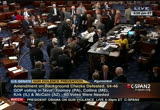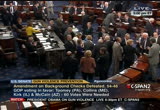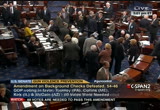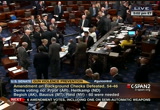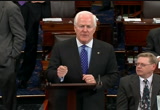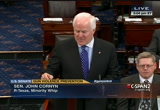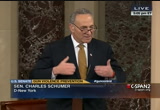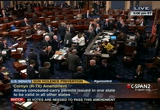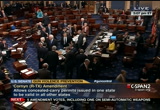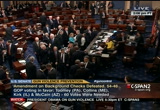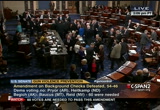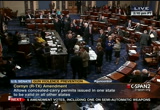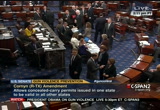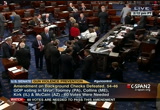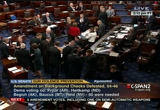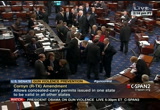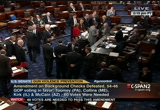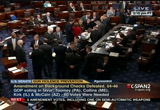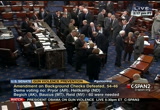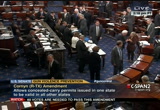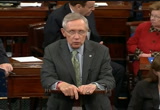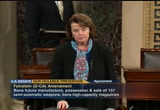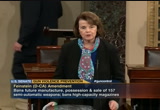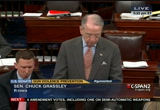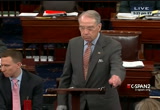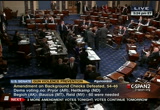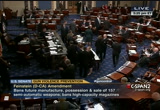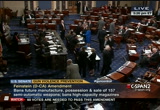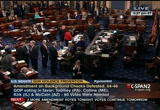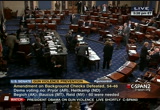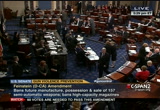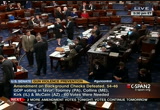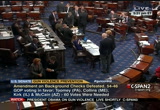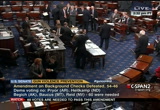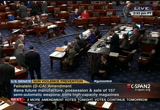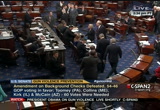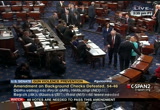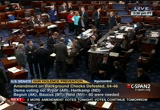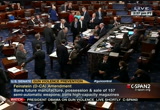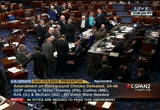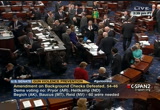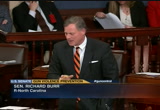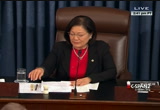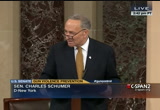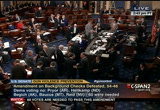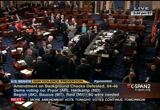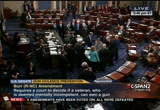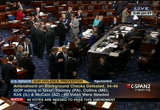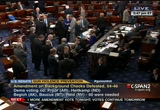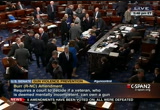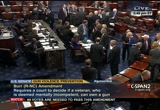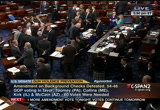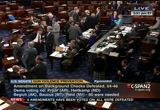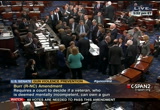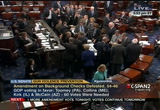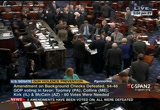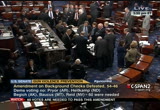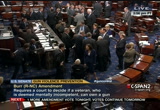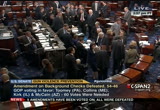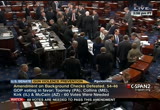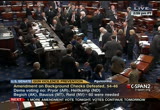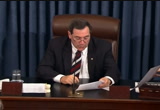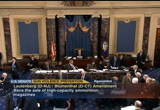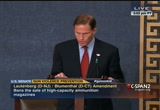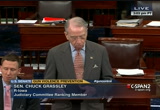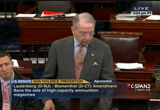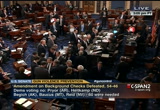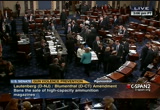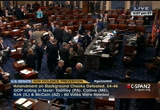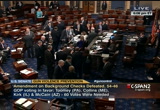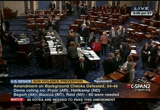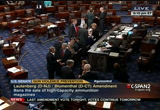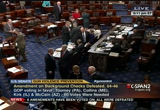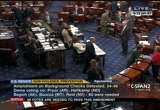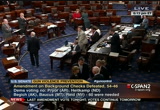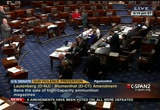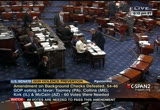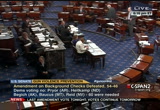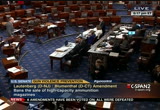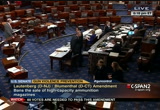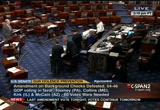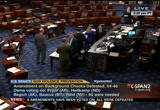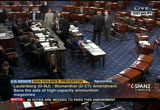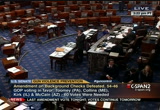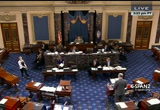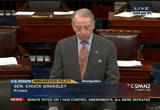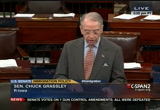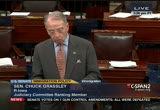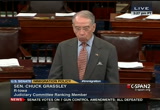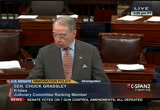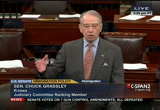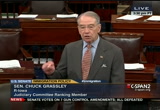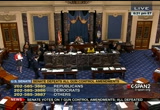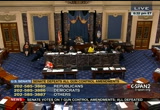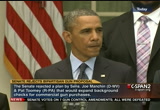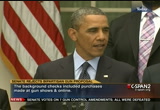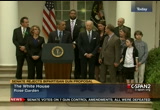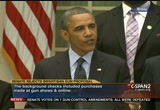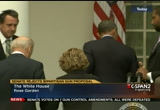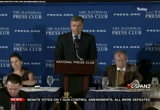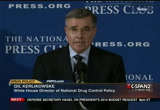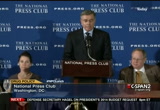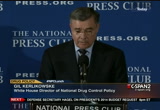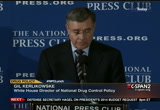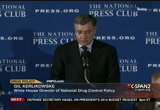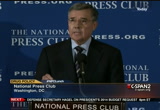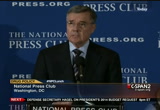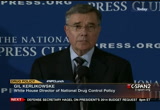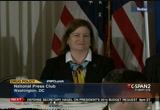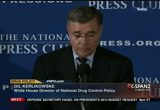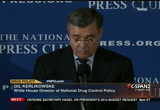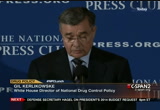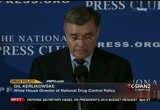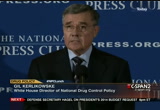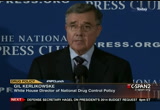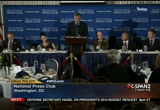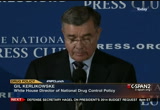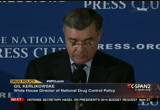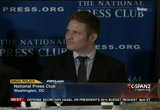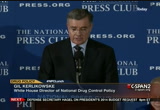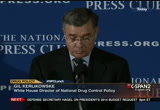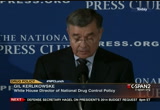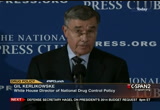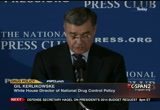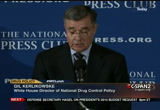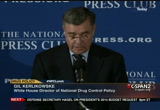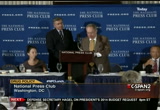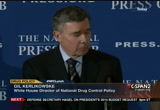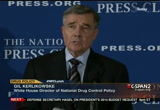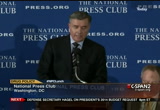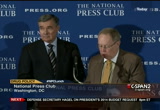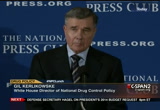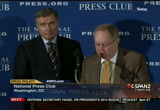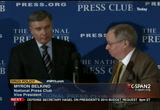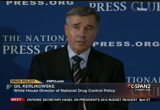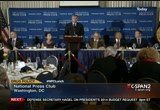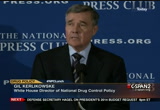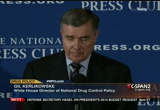tv U.S. Senate CSPAN April 17, 2013 5:00pm-8:00pm EDT
5:03 pm
under the previous order requiring 60 votes for the adoption of this amendment, the amendment is not agreed to. under the previous order, there are now two minutes -- mr. cornyn: the senate's not in order. mr. leahy: move to reconsider. the presiding officer: without objection. under the previous order, there are now two minutes of debate equally divided prior to a vote in relation to amendment number 719, offered by the senator from texas, mr. cornyn. mr. cornyn: mr. president if. the presiding officer: the senator from texas. mr. cornyn: my amendment is called the constitutional conceal carry act. the constitutional conceal carry act, because it's designed to protect the fundamental second amendment rights of american citizens who are traveling or temporarily away from home while they hold a concealed handgun license.
5:04 pm
there is only one state and the district of columbia that do not recognize some form of conceal gun carry law. in other words, it is part of the public policy of 49 states that conceal handgun licenses may be obtained by lawful owners. our amendment would allow persons with concealed handgun permits to carry those weapons as they travel between jurisdictions and not -- and avoid any sort of prosecution. this does not create a national standard. it does not apply to jurisdictions that don't otherwise recognize the right to conceal carry. and it would act, in effect, like a driver's license so you don't have to get a separate driver's license in each state that you travel through. and for those who believe background checks that are important, this is background checks on steroids. i'd ask my colleagues to support the amendment. mr. schumer: mr. president? the presiding officer: the senator from new york. mr. schumer: yeah, this amendment would wreak havoc in
5:05 pm
large portions of america, suburban and urban areas. now, the bottom line is very simple. wyoming, maybe concealed carry works. every police officer in america -- all of them -- will tell you that conceal carry would be a disaster in times square or in the l.a. coliseum or in dallas texans stadium. it would be a disgrace. police officers wouldn't know who's carrying and who isn't. and because there are no residency requirements, criminals from our states could go to states -- florida is one -- get a conceal carry permit and legally, criminals, feloniefelons, conceal carry inr states. now, we hear a lot of twawc aboutalk aboutstates' rights. this is a classic states' rights issue. let wyoming do what they want to
5:06 pm
do on conceal carry, but don't impose that on new york and vice versa. i strongly, strongly urge, that this amendment, which takes one way of life in america and imposes it on all ways of life, be defeated. the presiding officer: the senator's time has expired. the question is on the amendment. is there a sufficient second? there appears to be. the clerk will call the roll. vote:
5:19 pm
the presiding officer: are there any senators wishing to change their vote? on this vote the yeas are 57. the nays are 43. under the previous order requiring 60 votes for the adoption of this amendment, the amendment is not agreed to. mr. reid: move to reconsider. the presiding officer: without objection. mr. reid: mr. president? if i could have order? we're going to have three more votes tonight, three more votes tonight. and we're going to finish a number of things that have already been scheduled on this legislation tomorrow, and senator mcconnell will meet in the tphaoeupbl to decide what -- in the meantime to decide what our path forward is on this. three more votes tonight and we'll finish in the morning sometime. the presiding officer: under the previous order there are two minutes of debate equally divided prior to a vote in
5:20 pm
relation to amendment number 711 offered by the senator from california, mrs. feinstein. mrs. feinstein: mr. president? the presiding officer: the senator from california. mrs. feinstein: mr. president, i have watched these votes -- the presiding officer: there will be order. mrs. feinstein: -- and i must say i view them with substantial dismay at the lack of courage in this house, courage to stand up and say we've had enough of these killings. we've had enough of the development of highly militarized kinds of weapons -- mrs. boxer: the senate is not in order. the presiding officer: the senator from california. mrs. feinstein: we have had
5:21 pm
enough of the development of highly militarized weapons, easy to shoot, big clips, 100-plus bullets in each large-velocity guns falling into the hands of grievance killers, juveniles, people mentally disturbed. there will be no background checks apparently, and we have a proliferation of these weapons. i have a hard time understanding it. we're here on six-year terms for a reason: to take votes on difficult issues. everything needs 60 votes today. this is supposed to be a majority body. we have crafted an assault weapons bill to really represent the people of america. every single poll has shown support for this. the presiding officer: the senator's time has expired. mrs. feinstein: let me just end. i know how this is going to end, and the despair and the dismay
5:22 pm
of families standing out there whose safety we need to protect, and we don't do it. i am really shag -- chagrinned and concerned. anybody cares, vote at least to prospectively vote to ban the manufacture, the sale the importation of military-style assault weapons. show some guts. thank you. mr. grassley: mr. president, i strongly oppose this amendment. this would result in the largest ban of guns in the history of our republic. three studies the justice department funded found it did not stop columbine. it would not stop newtown. the ban does not apply to existing weapons such as those used at newtown.
5:23 pm
and criminals who would steal such guns would not care the at least if they were banned. we never received an opinion from the justice department that such a ban would satisfy the second amendment. i surmise that they're not able to conclude that it is constitutional. a ban on guns based on their looks when more powerful guns are exempt would not satisfy any standard of review. these guns are commonly used, in the words of the supreme court, for self-defense. they cannot be constitutionally banned. this is a slippery slope of compromising the second amendment. and you go down that road, you're going to find it easier to compromise other things in the bill of rights. i yield the floor. the presiding officer: the question is on the amendment. is there a sufficient second? there is. the clerk will call the roll.
5:39 pm
5:40 pm
under the previous order requiring 60 votes for the adoption of this amendment, the amendment is not agreed to. without objection, so ordered. under the previous order, there are now two minutes of debate equally divided prior to a vote in relation to amendment number 720 offered by the senator from north carolina, mr. burr. mr. burr: madam president? the presiding officer: the senator from north carolina. mr. burr: madam president, i -- the senate is not in order. the presiding officer: the senate will come to order. mr. burr: madam president, i am going to be brief because i do want my colleagues to listen. this is an important amendment. today the v.a. determination is that if a veteran can't handle their own finances, then their name is referred to theifier and they're put on the nics list. today 129,000 veterans are on
5:41 pm
the nics list. there is an appellate process to get off. but the appellate process doesn't provide -- the v.a. provides no help to the veteran. the cost is all incurred by the veteran. only 200 veterans have applied for that reversal in the decision, and only six have been granted. they should never be put on. a determination that they can't handle their own finances is not a determination that they are a threat to themselves or to the public. this bill is very simple. it says, if the v.a. makes a determination, there has to be a judicial decision to put them on the nics list. that's the standard everywhere else in the federal government. i urge my colleagues to support this very important piece of legislation. mr. schumer: madam president? the presiding officer: the senator from new york. mr. schumer: you know we began this debate, we talked about strengthening the nics system. we talked about how people who have mental illness should be added to the list, so they might
5:42 pm
not get guns. and here in one amendment, in one fell swoop, we will take 165,000 people off that list. does my colleague, my dear friend from north carolina, believe every single one of those people should be allowed to carry a gun? of course not. if there are injustices to some of those folks, then let's have a system that deals with it. but you don't -- you don't -- in one fell swoop take 165,000 people, all of whom have some degree of incompetence, off the list. it is unbelievable that at a time when we're supposed to be strengthening the nics system, with people who are ajudd indicated -- adjudicated or judged otherwise mentally ill, that we're considering tonight taking a giant step backward and reducing the list! what is america going to think is going on in this body?
5:43 pm
6:00 pm
the presiding officer: are there any senators wishing to vote or wishing to change their vote? if not, on this vote, the ayes are 56, the nays are 44. under the previous order requiring 60 votes for the adoption of this amendment, the amendment is not agreed to. a senator: move to reconsider. a senator: lay on the table. the presiding officer: without objection.
6:01 pm
mr. blumenthal: mr. president? the presiding officer: the senator from connecticut. mr. blumenthal: mr. president, on behalf of myself as well as that great champion and warrior, senator frank lautenberg, and others -- a senator: the senate is not in order. the presiding officer: the senate is not in order. mr. blumenthal: on behalf of myself, my friend and a great champion, senator frank lautenberg with us today and others, including my colleague, senator christopher murphy, i call up amendment number 714. the presiding officer: the clerk will report. the clerk: the senator from connecticut, mr. blumenthal, for mr. lautenberg and others, proposes amendment numbered 714 -- at the end, add the following -- mr. blumenthal: i ask that the reading be dispensed with. the presiding officer: without objection.
6:02 pm
mr. blumenthal: this amendment -- the presiding officer: two minutes of debate equally divided. mr. blumenthal: this amendment, very simply, mr. president, would ban high-capacity magazines of ten rounds or more, more than ten rounds, that are used to kill more people more quickly. in fact, have been used in more than half the mass shootings since 1982. i ask my colleagues to be listen to law enforcement, their police and prosecutors and others who are outgunned by criminals who use these high-capacity magazines, but i ask you also to listen to the families of newtown to nicole hochley, for example, whose son dylan was killed by a man -- the presiding officer: the senate is not in order. please take conversations out of the well. mr. blumenthal: a man who used a
6:03 pm
high-capacity magazine. she said of the man who killed her son he left the smaller capacity magazines at home. he knew that the larger capacity magazine clips were more lethal. and i ask you to listen to bill sherlach whose wife mary was killed on december 14. the presiding officer: the senator's time has expired. the senate is not in order. please take conversations out of the well. mr. blumenthal: i ask my colleagues to support this amendment, and i yield the floor. mr. grassley: mr. president? the presiding officer: the senator from iowa. mr. grassley: i oppose. in 2004, we had a study by the department of justice. that's the last time that we had the large-capacity magazine banned. if found, no evidence that banning such magazines has led to a reduction in gun violence. the study also concluded, and i quote -- "it is not clear how often the outcomes of the gun
6:04 pm
attacks depend on the ability of offenders to fire more than ten shots without reloading." end of quote. the report found no evidence that more people would be alive if the magazine over ten rounds were banned. secondly, no evidence that banning these magazines had reduced the deaths from gun crimes. in fact, when the previous ban was in effect, a higher percentage of gun crime victims were killed or wounded than before it was adopted. additionally, tens of millions of these magazines have been lawfully owned in this country for decades. they are in common use. they are not unusually dangerous. they are used by law-abiding citizens for self-defense, as in the case of law enforcement. it's a violation of the second amendment. i urge its defeat. the presiding officer: the question is on the amendment. i ask for -- is there a
6:05 pm
6:23 pm
are 54. under the previous order requiring 60 votes for the adoption of this amendment, the amendment is not agreed to. the majority leader. mr. reid: i ask unanimous consent following leader remarks tomorrow, april 18, the senate resume consideration of s. 649, the time until noon be equally divided and controlled between the two leaders or their designees, that would be for debate on the barrasso and harkin amendments, at noon the senate proceed to votes in relation to the barrasso and harkin amendments in that order with all previous provisions of remaining in neglect. the presiding officer: is there objection? so ordered. mr. reid: i ask unanimous consent the senate morning business until 7:30 with senators permitted to speak therein for ten minutes each. the presiding officer: without objection the senator from iowa. mr. grassley: at 2:24, the group of eight finally unveiled their immigration reform bill. since they began their meetings four months ago i've
6:24 pm
complimented them on reforming our broken immigration system. i've sought their cooperation to ensure the bill goes through the committee process and i've argued the bill must be open to amendment during consideration in committee and on the floor. every member of the senate must have an opportunity to read, analyze, and improve the bill. the bill we received is just under 900 pages and it tackles some very important issues, including measures on border security, e-verify and the entry exit system. it includes a legalization program for people here unlawfully including dream act eligible students and undocumented workers in the agricultural secretary tore. it attempts to move to a merit based and point system. it revises asylum procedures and the court structure governing immigration reforms. it includes reforms to the high
6:25 pm
skilled visa program and the guest worker program. it changes the way we implement the visa waiver program, and it includes a broad -- a brand-new, low-skilled temporary worker program that allows willing workers to enter the country without being sponsored by an employer. so you can see there's a lot covered in this bill. there is some new concepts, yet the majority seems to want to us push this bill through the committee process and are intent on getting it to the floor by june. the sponsors of the bill, the senior senator from new york, said he hopes the bill will be done in eight weeks. on friday, secretary napolitano scheduled to appear before the judiciary committee. it's my intent to dig into the details of the bill with her to understand the mechanics and how the bureaucracy will handle
6:26 pm
these changes. the secretary had better have answers, especially since this may be the only time we hear about how the administration will implement the major overhaul. the committee will then have a hearing on monday to discuss the bill. however, the topics will be broad and all-encompassing, i've been told. we have experts that need to be heard on this bill. most importantly, because cost is a big factor around here, we need to hear from the congressional budget office. knowing how much this bill costs taxpayers and whether it will actually be budget neutral is a critical important matter. let me reiterate. my desire to work on this bill, i think we need changes to our immigration system and to approve legal avenues for people to enter and remain in the united states. but this is not something to be
6:27 pm
rushed. we have to get this right. otherwise, the goal of the bipartisan group to solve the problem once and for all will not end. we have a long road ahead of us. in order to pass this legislation to reform our immigration system. we cannot tolerate anything less than a transparent and deliberative process to improve the bill. so let me get back to the point that i made just a few seconds ago. this is something that can't be rushed. we have to get it right. let me say why i emphasize that. there's only a few of us in the united states senate that voted on the 1986 immigration bill. we thought that we did it right. we thought that by making it for the first time illegal for employers to hire undocumented workers and have a $10,000 fine
6:28 pm
if they did, it would take away the magnet that would bring people across the border so readily. obviously for a better life for them, obviously, who can you find people who have good spiritual values, good family values, good work ethics, wants to improve themselves. that's what america is all about. but entering the country illegally is not something that a country based upon the rule of law can tolerate. but anyway, we made it illegal in 1986. and then that fine, we didn't anticipate a whole industry of fraudulent documents. so if i go to an employer and i'm here unlawfully and i show him a passport that looks like it's the real thing, then, you know, they can't be fined $10,000 for hiring me. so we took away that magnet and
6:29 pm
we thought at the time, well, might as well legalize the three million people that are here and we did, based on a proposition we were fixing this thing once and for all. but we know what happens when you -- when you make it legitimate to violate the rule of law. instead of three million people, there are 12 million people that are in the country undocumented. so when i read the preamble of the document put out by the group of eight -- and i'm not finding fault with this. they make it very clear that we intend to -- i'm paraphrasing it but we intend to fix this system once and for all so it never has to be revisited. that's exactly what we thought in 1986. well, we were wrong. we were wrong. and so that's why i come to the
6:30 pm
floor tonight to plead as i did about a 900-page bill that just has come out, 2:24 this morning , and presumably the secretary of homeland security is coming before our committee in less than 48 hours to answer our questions. i wonder myself if she can fully understand it so she can answer our questions. i think it's a legitimate question when the group of eight comes up with a proposition that we're going to fix this thing once and for all, well, i hope -- i hope they have a pattern to do that. and i hope they don't make the same mistake we do. but rushing this thing along has the tendency to be an environment for a screw-up like we had in 1986 when we spent weeks and weeks on legislation to get it right and we didn't
6:31 pm
6:32 pm
6:33 pm
gun so i can do his job and help put in place a plan to protect her children in their schools. but we can do more if congress gets its act together. if this congress refuses to listen to the american people and pass commonsense gun legislation, the real impact is going to have to come from the voters. all the people who supported this legislation, law enforcement and responsible gun owners, democrats and republicans, urban moms, rural hunters, whoever you are here need to let your representative of congress know that you are disappointed and if they don't act this time you will remember come election time. to the wide majority of nra households who supported this legislation you need to let your leadership and lobbyists in
6:34 pm
washington know they didn't represent your views on this one. the point is those who care deeply about preventing more and more gun violence will have to be as passionate and is organized and his vocal as those who blocked it -- the commonsense steps to help keep our children safe. ultimately you outnumbered those who argue the other way but they are better organized and they are better financed. they have been at it longer, and they make sure that they focus on this one issue during election and that is the reason why you can pass something that 90% of americans support and you can't get it through the senate or the house of representatives. to change washington used the
6:35 pm
american people are going to have to sustain some passion about this. when necessary you have to send the right people to washington and that requires strength and requires persistence and that's the one thing these families should have inspired in all of this. i still don't know how they have been able to muster up the strength to do what they have been doing over the last several weeks and the last several months. and i see this is just round one. when newtown happened i met with these families and i spoke to the community and i said something must be different right now. we are going to have to change. that is what the whole country
6:36 pm
says. everybody talks about how we were going to change it and make sure this didn't happen again. just like everybody talked about how we needed to do something after our were off. everybody talked about we need to change and do something. and i am assuming that the emotions that we have all felt since newtown, the emotions that we have all felt since tucson and aurora and chicago, the pain we shared when these families and families all across the country who lost a loved one to gun violence i'm assuming that is not a temporary thing. i am assuming our expression of grief and our commitment to do something different to prevent these things from happening are not empty words.
6:37 pm
6:38 pm
6:39 pm
talk about a lot in a few minutes along with a couple of other people up here also that i've been so impressed with. the drug policy issue and the policy problems are complex and difficult and that is why i am so appreciative of this forum, to be able to talk a little bit more at length about it and then certainly to answer the question let me also mention that diana lyman has written extensively also about the drug problems in this country and i'm no it was mentioned in the introduction earlier. she is in boston right now with so many other journalists covering that real tragedy and i know as my wife and i have given our thoughts and prayers to those people i know you very much feel the same way.
6:40 pm
let me recognize several other people that are here and i would love to recognize, i could spend the entire hour and i wouldn't have to answer a single question recognizing everybody in the audience. but dog sitting to my right is the chief spokesperson during the clinton administration and off not only helps with others to certainly organize this but his continued energy and commitment to the drug issue over the years has really made this possible and i appreciate everything he has done. [applause] i think it's probably most appropriate that i start off with what has consumed the media quite a bit over the last several years. let me talk about marijuana. i know that was something that i may get a question about later on. as you know possession of small amounts of marijuana by an adult
6:41 pm
became legal in two states, colorado and washington. those are both proposition initiative states and it was on their ballot. there are differences by the way between the two states and what they passed. they really present all of this, health care professionals school administrators in so many others, elected officials law enforcement. they present us with a set of complex questions and above all though i have to repeat that the justice department are federal united states department of justice has the responsibility to enforce the controlled substances act and that remains unchanged. no state, no executive can nullify a statute that has been passed by congress. as the department of justice has noted though federal drug enforcement resources just like i did as the police chief we prioritize and target the serious crimes, the serious crimes of drug dealing violent
6:42 pm
crime and trafficking. let's be clear that law enforcement officials take an old of office to uphold federal law and they are going to continue to pursue drug traffickers, drug dealers, transnational criminal organizations all of which we -- week in our communities and pose threats to our nation. too often discussions about marijuana, whether making the drug more widely and easily available, which it would need when it becomes legal would make the problem go away if it was only legal. the legal legal status of the rowana including the enforcement of existing law is a matter for the department of justice. the department of justice enforcement of the controlled substances act, the federal love remains unchanged. we shouldn't lose sight of the fundamental fact though that using marijuana has public-health consequences. in a most responsible public
6:43 pm
policy is one that restricts its availability and discourages its use. i recognize the marijuana debate has taken up quite a bit of space but i want to turn to something that affects most americans americans today and and a subject that the obama administration has really been focused on for these past four years. we are going to remain focused in this area for the next four years. that is achieving real evidence-based drug policy reform to both reduce drug use but also the consequences. more and more the debate about drug policy in america is becoming extremely polarized. one side advocates in believing that legalization is the only path to drug policy reform. legalization is described as solving mexico's organized crime and violence problems and creating a windfall for state and local coffers here in the united states and along with many other benefits that are all
6:44 pm
talked about legalization. and you have the other hand. the other hand we have the enforcement centric war on drugs that was mentioned in my introduction and that approach and that is one that treats addiction primarily as a criminal justice problem despite this ever-growing body of scientific knowledge and evidence that this approach is counterproductive and is not effective. slogans and sound bytes don't make responsible public policy and neither of these extreme positions prevent the 21st century approach that is very complicated to this drug policy issues. in fact if you give an answer to her drug problem on a bumper sticker you can be assured of one thing and that answer is that it's wrong. so if we oppose a war on drugs what shape should drug policy
6:45 pm
reform take lex i think the answer is really right here in this room here at the dais and certainly here in the audience. i've invited several pioneers. i can say that general because you are a pioneer. bob said to be a pioneer but he is on his way. i had invited these pioneers who've dedicated their life to mitigating the harm substance abuse of our nation but particularly to our youth. these people stand as a vanguard of a what really and truly is drug policy reform. what they are doing doesn't look much like a war and doesn't look much like legalization. their work often goes unrecognized and that is why it's important in this form to be able to bring a voice and information about what they do because it often doesn't make the headlines. giving them a voice in this national debate i think is extremely important.
6:46 pm
the key aspect of drug policy reform involves the health care profession. nurses ,-com,-com ma nurse practitioners physician psychologists, psychiatrists, these professionals work to safeguard and improve our health and it makes sense that they should play a role in preventing a chronic disease that has touched almost every american in some way and of course that disease is the disease of addiction. in reality we can't arrest or incarcerate our way out of this drug problem. the average individual meets with a health care professional about once a year. we know that addictive disorders are progressive diseases. doesn't make sense then to bring this intervention into the primary care focus, an opportunity to talk about substance abuse at the time that person is meeting with and talking to a health care professional. that annual meeting can be a key intervention point for stopping substance use disorder from
6:47 pm
progressing and for that to happen health care professionals have to have the tools to intervene early. they have to refer an individual to treatment if necessary and they have to help that individual and sustaining their recovery. the american society of addiction medicine is a key partner in our efforts to reform drug policy and that is why i have asked dr. kelly clark who is here who sits on the american society of addiction medicine board of directors and that is why she is here today. dr. clark has devoted her career to public health. she is now helping steer the organization that pioneers the study of addiction, the science of understanding addictive disorders, the most effective for preventing and treating substance use disorders. the core purpose is to improve care and the treatment of people with the disease of addiction
6:48 pm
and advance the practice of addiction medicine. the group recently developed a course to train physicians in proper prescribing through the food and drug administration, what is called risk evaluation, mitigation strategy. i'm going to talk a little bit more about the prescription drug issue and get a little more context around it but it emphasizes all of us working together. ..
6:49 pm
>> the administration took unprecedented actions to treat disorders as a public health issue, not just a criminal justice one. now, already, we spend more on drug treatment and prevention than we do on u.s. domestic drug law enforcement and incarceration. just last week, the president's budget contained a request for congress to increase funding for treatment by 1.4 billion dollars over fiscal year 201312. this is the largest such request for increase in treatment in two decades. we're also -- [applause]
6:50 pm
we're also expanding other recognized programs like screening brief intervention and referral to treatment. we have acronyms in the federal government for these. [laughter] it trains doctors, health care professionals to identify the signs of problematic substance use early and before it's a chronic disorder or criminal justice problem, and when a person gets that early intervention, it's one more effective and, two, it's far less costly to the taxpayer. our country deals with what the center for disease control and prevention call an epidemic of prescription drug abuse, and dr. feedman is the head of the cdc, and does not take that lightly at all. it's hard to believe that more people die in this country from prescription drug overdoses than from both cocaine and heroin overdoses combined. in 2010, there were 40,000 drug induced deaths in america and more than 22,000 of those
6:51 pm
involved prescription drugs, and 16,000 involved those prescription painkillers that i mentioned earlier. we are making headway on this epidemic taking it on and thanks to a lot of the work of journalists who put it on the front pages. we are making some progress. thanks to a lot of other hard work by lots of other people. young adult usage is the lowest in a decade. far too many people continue to lose lives as a result of prescription drugs, but i believe we'll begin to reverse the treen. the obama administration is committed to supporting progressive evidence-based programs that can make a real difference right away. for the first time, we are working and supporting the use of those, reversal drug so that first responders are prepared to safely handle individuals who
6:52 pm
are experiencing life threatening overdoses and help prevent doubts associated with the nation's drug abuse epidemic. in 2010, changing the subject for a minute, in 2010, president obama eliminated minimum sentence for possession of crack cocaine. we know the disparity, sentencing, particularly the impact in the african-american community, could be quite devastating. well, this is the first time or that was the first time in 40 years a mandatory drug sentence was repealedded, done, by the way, in a bipartisan manner. we're institutionalizing a public health approach to drug policy with the affordable care act. there's another name for the affordable care act, but we call it the affordable care act. [laughter] it's going to make a big difference with people in this
6:53 pm
field particularly requiring insurance companies to treat disorders like any other disease. this is revolutionary because the treatment of drug problems has been isolated or siloed and it needs to be part of the primary health care system. we estimate that with aca's 62.5 million people are going to receive health insurance benefits covering expanded substance abuse and mental health treatment services by 2020. with 32.1 million people gaining those benefits for the first time. well, we have an estimated 22 million people in need of treatment who currently are not getting it, and having that availability is going to be important, and you may ask why a number of those people don't get treatment they need now, and it's oftentimes because of the stigma associated around drug abuse, and we're going to talk about that in just a second, so the things that i just outlined to you, all around public
6:54 pm
health, you notice that this almost the first third of this prevention has little to to do r nothing to do with the law enforcement. this is what drug policy reform looks like. what looks like a doctor, looks like a nurse, looks like another health care professional. it looks like local community members who come together to address these issues. looks, in fact, kind of like general dean, by it mostly looks like the community antidrug coalitions of america. we've had the joy and the opportunity to work with general dean and his outstanding staff, not only throughout the country, but also in many other countries as the drug problem doesn't just belong to the united states. well, general dean, i thank you for being here today. he's been the chairman and ceo of for 13 years following a distinguished military career.
6:55 pm
they operate on the knowledge that substance abuse prevention is the best and most cost effective way to deal with this reducing drug use and stop addictive disorders from developing among young people. you remember, some of you are old enough to remember just say no. i won't look at anyone in particular, or you remember your brain on drugs, but, you know what? that's not effective messages today. today, we know so much more about what works and what doesn't work, and helping young people make healthy decisions about their futures. well, cadca is practicing true drug policy reform promoting innovative, prevention based solution programs with tailored programs training at the local and grassroots levels proving every day that we can successful empower young people to make healthy decisions about their future. through the white house and support of congress, we fund
6:56 pm
hundreds of coalitions, each of these coalitions leverages federal funds to create tailor-made local solutions. prevention makes sense. it helps young people grow healthier and smarter, and empowering them is a way of the future for prevention. exercising prevention over incars vaition is what drug policy reform looks like today. true drug policy reform involves people speaking up. as an individual in recovery, they want to see that these people are successful and that they overcame the disease of adduction. last year, i spoke to a group of leaders in the recovery community of the betty ford center, one of the country's longest running and best known treatment facilities. i was inspired by those in long term recovery who i met, and i asked everyone in recovery to speak out, to share their stories because by celebrating recovery, we lift stigma that
6:57 pm
still surround disorders. some recovery community took up the important task of speaking out about recovery. i've been so impress by their commitment to raising awareness and lifting the stigma. one of the leaders joins us today, and that's devin fox, executive director of a growing organization called young people in recovery. he shared his story with others. i wanted to tell you a little bit about it also. he started using drugs as a freshman in college at 18, and soon binge drinking and marijuana use increased to methamphetamine when he was 20. he didn't ask to be afflictedded with the disease of addiction, but, today, he's in long term recovery from drugs and alcohol, and he is giving back to the community, particularly the recovery community every single day. he graduated with a masters in social work, working with new jersey's division of mental
6:58 pm
health and addiction services as recovery advocate, and demonstrating that people who suffer with substance use disorders deserve a chance to get better. americans living with this disease can really reach their maximum potential just like he has. his story is not that unique. he's just one of 23 million americans in recovery, and a part of the growing movement to lift the stigma associated with this disease, and it's because of people like him that we've established for the first time ever in our office a recovery branch. sounds like a huge organization, but it's actually two people, but they are the two hardest working people that i've ever seen. [laughter] for us to put emphasis and understand the differences between treatment and recovery, i think, is a good step in the right direction for us. i want to thank you on behalf of the work rt recovery community, and thank you for joining us
6:59 pm
today. thank you. [applause] >> well his work reminds us addiction is not a disease that discriminated by age, gender, race, or socioeconomic status, but the more we're able to bring the discussion of addictive disorders into the light of day, the more readily we can understand and treat them. unfortunately, we have to remember that many people, that people charged with drug-related crimes are often ill. they are afflicted with an underlying substance use disoird. many of the people don't need jail time. they need treatment. they deserve a chance to recover and change lives. we're seeing this all across the country. that's why the administration is working to expand innovative programs like drug court and divert the non-violent offenders into treatment instead of prison. in the drug core program, drug offenders are provided with
7:00 pm
treatment services and monitored closely by a judge who holds them accountable, and there's several judges here that just do that splendidly, and that either it rewards them for staying clean, or it sanctions them for not holding up their end of the bargain with the criminal justice system, and by giving non-violence drug offenders the chance to reclaim their lives through treatment rather than wasting away in jail, we can begin to break that cycle of drug use, crime, and incarceration. this kind of reform not only saves lives, it saves taxpayer dollars as well, and reduces the incarceration rates in this country. today, i'm proud to announce our office is awarding a $1.4 million grant to the national association of drug core professionals. their executive director is here along with a number of their board members. this is the country's leading drug court organization, trains
7:01 pm
drug court professionals who work to divert nonviolent drug offenders again into treatment instead of jail. already, because of the work they have, thousands of nonviolent offenders are diverted into treatments instead of prison through the now more than now 2700 -- do i have that right? 2700 drug courts in the country. when we work for janet renaud decades ago, there was just one drug court in miami with judge goldstein, and so to see the expansion of an evidence-based program that actually works, i think is truly heartening. we hope this new grant will bring the work and continue the work and progress you have done and all proud to be with you and be supporters of drug court, and this is what policy reform looks like. they represent just some of the
7:02 pm
innovations of drug policies that are achieved today. it's a shift to prevention, to treatment, recovery services, and criminal justice reform, it is a shift to science and towards evidence-based programs that strengthen public health and safety. drug policy reform is not easy, and there is no quick fix solution. what i outlined today is not a slogan on a bumper sticker or make unfortunately, for the journalist, doesn't make catchy headlines, but the approach works, each year diverting 1 # 00,000 people through treatment instead of prison because of drug courts rn and for the first time in decades, our u.s. prison population is declining, and guess what? our use of drugs in many places and in many types of drugs is also declining. let me give you a couple examples. koa cape use is dropping as are
7:03 pm
the deaths of overdose from that drug. the most recent data from 20 # 11 shows the number of users from methamphetamine is down about 40% from 2006 so when they say, gee, we can't make progress on this, well, we can make progress. it's just very difficult sometimes to get that message out there, and certainly people i've identified know. we are beginning to turn the program, and increasingly law enforcement and the law enforcement community is getting smarter on reducing drug use and consequences in america. i should note that the strong professorship between law enforcement and the public health community is not unique now just to drug policy. we also see that partnership in the debate about gun violence. that is why when president obama announced 23 executive actions to reduce gun violence in
7:04 pm
america, he also included actions to address the role that mental health plays in reducing this challenge. there are common sense steppings supportedded not only by law enforcement and common sense steps that he's proposed that's also supported by the public health community. well, let me close by telling you further what drug policy reform looks like from my perspective. it's about helping women with substance use disorders get access to prenatal care so that their chirp get a healthy start in life. it's about showing teenagers that a health plan to adulthood to succeed as productive members of society with the skills they need to compete in a 21st century workplace are given to them, and it's about the person struggling with addiction an opportunity to go to treatment to receive support in their recovery. drug policy reform should be rooted in neuroscience, not political science. that's what a 21st century
7:05 pm
approach to drug policy looks like. we have a plan where workers are skilled to compete in a global market place, and those who need treatment are going to receive it, one where children feel safe is because we have done everything in our power to keep weapons out of the hands of criminals and the mentally ill. i thank you all of you, and i'm happy to take your questions. [applause] >> thank thank you, director. some said the president was silent on the referendum in the election because even though the
7:06 pm
administration's policy is against them, the voters for them were overwhelmingly democrat, and the white house didn't want to lose those votes. is that true or false, and any comment? >> well, i would tell you two things, one is that i think if you look at the election and how much of the effort around the presidential election was around jobs and the economy and reverted back to talking about the economy and jobs, the president has been on the record quite a bit opposing legalization and the decriminalization of our drug laws, but he's very much on the record of saying that a public health approach would be most effective, so i look at those, and i looked at those candidates, and i could not be more supportive of not only the person that i work for, but the support he's given me and given this office in reforming policies i talked about a american ago. >> thank you.
7:07 pm
>> how would you characterize the pharmaceutical company's responses to the abuse of prescription narcotics? you touched on prescription, but we have a question if you could expabd. >> there's been progress by the pharmaceutical industry on this. first of all, as you know, from some of the news releases yesterday from the food and drug administration, the abuse deterrent formulas of these very power. -- powerful drugs, oxcotin will not be generic. to use them, they have to crush them, use them in a syringe, and the fda is not going to allow generics that don't meet abuse resistance formula. we received good support in our discussions with the pharmaceutical industry about the importance of them op the
7:08 pm
education part. the rims i talked about earlier, the national institute of drug abuse also has on its website some training courses for professionals in the health care industry, so i think the pharmaceutical industry can do more. frankly, i think they should do more in this area, but we're making some progress. >> two questions related to your role in the government, and they are different questions, but splash. do you feel your role is reduced? you're no longer in the cabinet, and your office budget dropped by 25%. does this reflect the administration's declining interest in drug control? >> one of the positions the drug czar has held a cabinet level status, and when the secretary
7:09 pm
was the first drug czar, it was not a cabinet level position, and i met with the drug czars, and when i met with secretary bennet, he said, look, as long as you feel you have the ability to talk with the people in the administration and have their ear and have their support, he said i've been in the cabinet not all that exciting. [laughter] they continue to take about the same amount of reduction of many other components, and we just have to figure out smart ways to work through it. >> thank you. staying on budgetary matters, why did you only request $25 million for the youth antidrug media advertising campaign and not complain more loudly when congress dropped it further to zero when it past years it was 150 million dollars? >> so the youth antidrug media
7:10 pm
is what i mentioned earlier in talking about this is your brain on drugs, different commercials, and one time it was 190 million. some of the research showed that -- or it was very difficult to show that those kind of commercials were actually making a difference in preventing drug use, and so the first week that i assumed office in 2009, congress had already zeroed out that budget which was a smaller amount. i went up and asked if congress would reinstate that money, and that i would, in fact, revamp the media campaign, which we've been able to do. the media campaign is largely run through social media today, which is, of course, not only resinates better with young people, but certainly is far less exceptive than some of the costs of other, more traditional advertising. both years, last year and this year, the president has asked for money for the media campaign, both years, congress
7:11 pm
has not shown a willingness to do that. kids, frankly, get plenty of pro-drug messages. i think they need a small amount of money to give them a solid, evidence based message, but we continue to work with private partners also to keep the program alive. it's a call above influence. you can see some of the commercials on our website. don't call me and say i don't get it because it's actually not for your age. [laughter] >> would you agree with your former health care partner in the united king dome, profession david nut, when he said in a london newspaper interview over the weekend that cocaine use in the banking industry was a factor behind the global financial crisis? >> you know, i actually have not read that, and i can tell you the cocaine issue, especially
7:12 pm
the powder cocaine was an seen at a higher socioeconomic abuse level, but, frankly, i think the information that's gotten out about the dangers of cocaine and the problems are helping to show decrease in consumption in this country, but i'm not so sure banking crisis are attributed to cocaine, but that's his. obviously. [laughter] >> why suspect there more drug treatment in prisons when two-thirds of arrestees test positive, and experts say treatment could stop recidivism by as much as half? >> sure. we've been strong proponents of treatment behind the walls as it's called, and that's very important. we do a program where we test people that sponsor the people,
7:13 pm
people are tested that go into jails arrested throughout the country. people air air force arrested fr everything from shop resting to breaking into a house, ect.. about 50% of the people arrested regardless of the crime have some abuse problem, and so as a police chief, it really made a lot of sense to me to figure out that we should be dealing with their substance abuse problem, and if we don't, when they get out, that recidivism is going to occur, and we're just going to be continuing to recycle people through the system, so we've -- like, i could not be more proud of the federal bureau of prisons and in the leadership in the department of justice for the federal bureau of prisons where they actually hired and brought in, bringing on board additional drug treatment professionals, but i've also been proud of the fact that even some of the most conservative governors in this country have looked at treatment behind the walls and actually taken some of their very tight
7:14 pm
state budgets, realizing that they need to invest in that, and i think if you were to look at the work of reforming criminal justice policy, that the pugh center led, i think that's win of the hallmarks so i think we're making progress. i think we need to do more. i think we need to be able to convince people that treatment works, and that's one of those issues that we need to continue to voice. >> please share comments op potential impact on sequester effects on your drug policy reform. >> we're very concerned about sequesteration when it comes to making reforms needed. first, from my old half of the law enforcement community, it means that we will have furloughs and other reductions go through. we would actually have left federal law enforcement agents, whether it's in the border
7:15 pm
patrol or others, there would be less available hours. i think given the important work that they do in so many ways, not just stopping drugs from coming across the border, but the important issues around human trafficking and other types of crimes that we don't want to lose those valuable and needed resources, yet, sequesteration will impact them. the other part concerns is the amount of drug treatment. if you read articles that came out today and last night about the importance of having drug treatment available, quality drug treatment programs, that's going to be concerning because so much of the drug treatment programs are paid for with federal block grant dollars, and with those dollars being reduced, we actually have the potential to lose literally tens of thousands of vitally needed treatment beds, treatment beds
7:16 pm
that make a difference. >> one asks why have you been not talking about lancearmstrong and the other high profile cases? >> i think the doping in sports has been an important part of the discussion. our office has membership, although we certainly don't control, our office has membership and provides dues to two groups, wada and usada. wada ises world antidoping association, and usada being the united states. you know, rather than criticize and hold any one individual up, i think that it's important that we share our membership in that organization with not only doing
7:17 pm
the work that has to be done to prevent athletes from using those sub stapses, but also supporting the science that goes along with developing the test that will uncover it so essentially as the president says issue everybody should play from a level playing field. >> someone observes that you used the term "substance use" rather than "abuse," why is that, and is that the correct observation? >> i didn't notice. [laughter] you know, i mean, i -- i think it's important that you also recognize that we speak out quite often on underage alcohol issues. if you talk to presidents of colleges and others, you talk to people whose kids are in college, the alcohol binge drinking, underage use is quite dangerous and quite concerning, and so looking at these -- looking at all of these sub stapses and not trying to silo
51 Views
IN COLLECTIONS
CSPAN2 Television Archive
Television Archive  Television Archive News Search Service
Television Archive News Search Service 
Uploaded by TV Archive on

 Live Music Archive
Live Music Archive Librivox Free Audio
Librivox Free Audio Metropolitan Museum
Metropolitan Museum Cleveland Museum of Art
Cleveland Museum of Art Internet Arcade
Internet Arcade Console Living Room
Console Living Room Books to Borrow
Books to Borrow Open Library
Open Library TV News
TV News Understanding 9/11
Understanding 9/11